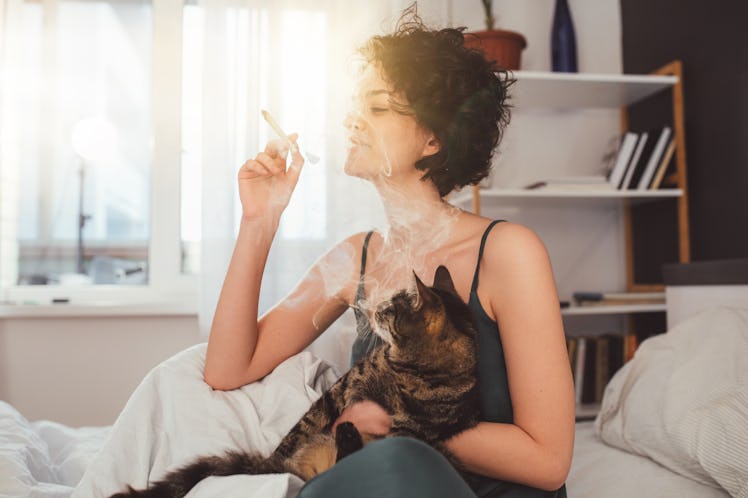
4 Ways To Avoid A Case Of The Munchies After Smoking Weed
Step one: Drink lots of water.
As dozens of states and Washington, D.C. have moved to legalize recreational marijuana, smoking weed has become increasingly acceptable in the mainstream. According to an April 2021 survey conducted by the Pew Research Center, 60 percent of Americans believe that cannabis should be legal for recreational use. That’s a big number.
Now that having an occasional joint after work is beginning to become as normalized as having a beer when you clock out, it’s time to discuss the implications this may have on your ability to maintain the health you desire. There is, after all, a side effect of smoking weed that you may have heard of: the munchies. This term refers to the food cravings people often get after consuming cannabis.
What causes the munchies? Some emerging research suggests that the tetrahydrocannabinol (or THC) found in marijuana may contribute to an increased sense of smell — which can also often lead to an increased appetite. So, how can you enjoy an edible now and then and avoid the munchies? And are the munchies really as awful as people make them out to be? Here are some expert-backed suggestions to follow next time you light up. Whether you stave off the hunger cravings or not, you’ll be able to enjoy yourself and relax a little more.
1. Drink Lots Of Water
If you start to feel the munchies coming on, before you slink into your pantry, pour yourself a glass of water. “Oftentimes when we are thirsty, we get hungry,” Dr. Melissa Prest, national spokesperson for the Academy of Nutrition and Dietetics, tells Elite Daily. “So stay hydrated and drink plenty of non-caffeinated fluids like water, sparkling water, decaf coffee, [and] herbal tea before, during, and after smoking.” However, Prest suggests steering clear of super sugary beverages like soda or juice, as “sugary foods also make us more thirsty,” which could send you right back to square one (a.k.a. craving Double Stuf Oreos and Ben & Jerry's).
2. Chew Your Favorite Gum
Another effective way to stave off a case of the munchies? Chewing gum. “This helps to keep your mouth from being dry and may actually help you to have less cravings,” Prest tells Elite Daily. One 2020 study in Frontiers in Psychology found that chewing gum helps diminish food cravings because it triggers a chewing sensation in your brain, temporarily reducing your appetite. If you’re trying to be super health-conscious, just opt for a sugar-free flavor.
3. Get Enough Sleep
This doesn’t necessarily mean going to bed when you’re craving snacks after smoking (although this might be one way to avoid the munchies). Research has shown that getting too little sleep on a long-term basis can mess with the appetite regulators in your brain. In other words, if you’re only clocking in five hours of shut-eye most nights of the week, you may find those cannabis hunger cravings harder to avoid.
4. If You Can’t Fight Off A Craving, Don’t Be Too Hard On Yourself
As Prest stressed to Elite Daily, “Sometimes you just really have a craving for something, which is OK.” Just try eating a smaller portion of whatever food you’re craving — so instead of an entire can of Pringles, maybe just treat yourself to half the can. (And then stash the remaining Pringles far, far away from yourself.) Have things like veggies, fruit, jerky, and popcorn to grab in a time of need — aka when the munchies strike. Next time you’re hit with a serious hankering for ice cream, you can grab something from your pre-determined munchies stash. Your sober self will thank you.
Studies:
Green, T. V. (2021, April 16). Americans overwhelmingly say marijuana should be legal for recreational or medical use. Pew Research Center. https://www.pewresearch.org/fact-tank/2021/04/16/americans-overwhelmingly-say-marijuana-should-be-legal-for-recreational-or-medical-use/
Soria-Gómez, E., Bellocchio, L., Reguero, L., Lepousez, G., Martin, C., Bendahmane, M., Ruehle, S., Remmers, F., Desprez, T., Matias, I., Wiesner, T., Cannich, A., Nissant, A., Wadleigh, A., Pape, H.-C., Chiarlone, A. P., Quarta, C., Verrier, D., Vincent, P., … Marsicano, G. (2014). The endocannabinoid system controls food intake via olfactory processes. Nature Neuroscience, 17(3), 407–415. https://doi.org/10.1038/nn.3647
Ikeda, A., Miyamoto, J. J., Usui, N., Taira, M., & Moriyama, K. (2018). Chewing stimulation Reduces Appetite Ratings and Attentional Bias Toward Visual Food Stimuli In Healthy-Weight Individuals. Frontiers in Psychology, 9. https://doi.org/10.3389/fpsyg.2018.00099
Greer, S. M., Goldstein, A. N., & Walker, M. P. (2013). The impact of sleep deprivation on food desire in the human brain. Nature Communications, 4(1). https://doi.org/10.1038/ncomms3259
Experts:
Dr. Melissa Prest, national spokesperson for the Academy of Nutrition and Dietetics
This article was originally published on